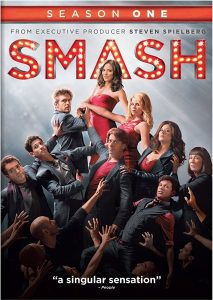I have to confess that I generally don’t enjoy musicals. With the notable exception of the “Buffy” musical episode, the genre doesn’t work for me. Most musicals are repetitive, using songs to emphasize what we already saw in the between-songs scenes; many of them repeat the same song multiple times; and often the overall story is predictable: Guy and girl are meant for each other but don’t know it, comedy ensues and they end up together — that sort of thing.
I had cautious optimism for “Smash” (9 p.m. Mondays on NBC, starts Feb. 6), thinking that the long-playing format of television would allow for more complex characters and situations between the songs. But the pilot episode, which is already posted on Hulu, suggests that the opposite is the case.
Almost every character is a show-business cliché, especially Derek Wills, the lead casting director for the new Marilyn Monroe musical at the center of “Smash.” Jack Davenport was so likeable on “Swingtown,” but here he plays the holier-than-thou, British-accented veteran who I wouldn’t be surprised to see take advantage of an ingénue who’s willing to do anything to get a role. Previews suggest one of the two contenders for the Marilyn role, Megan Hilty’s Ivy, does indeed sleep with Jack in an upcoming episode to get an edge in the auditions.
The other contender, Katharine McPhee’s Karen, is a salt-of-the-earth Iowa girl whose parents (one of whom was also the “Freaks and Geeks” mom) love her but wish she wasn’t throwing all her heart into this long-shot dream of becoming a Broadway star.
The rivalry between Ivy and Karen, both of whom we see working hard and paying their dues to get this role, is potentially interesting because they aren’t written as hero and villain, but rather as two equally deserving performers. Although buxom blonde Ivy is pitched as the obvious Marilyn and lithe brunette Karen is the not-obvious-but-perhaps-more-interesting choice, I found both of them a little too perfect.
I suppose they should be great on stage in order to get this far in the audition process, but it’d be nice if their off-stage lives would be grittier. Karen — who waits tables to pay the bills (of course) — has a loving boyfriend, although it looks like the writers will play up her commitment-phobe angle in upcoming episodes to squeeze out some conflict. Ivy has supportive friends and already has an industry foothold (she’s in the chorus of a hit show), although it’s subtly suggested that she comes from a poor family and desperately needs a breakthrough role.
The “Marilyn” writer, Debra Messing’s Julia, has the at-home drama of adopting a kid and dealing with a husband who wishes she would focus on home life rather than the world of musicals. The adoption thread is a yawner on arrival; the same plot is more compelling on “Parenthood,” and even there it’s the weakest plot on the show.
More drama in upcoming episodes will come from Anjelica Huston’s Eilleen — the money behind “Marilyn” — having trouble getting the cash together as she goes through a divorce.

All of these elements come together to paint what feels like a typical portrait of the making of a new (potentially Broadway) musical. I suspect “Smash” creator Theresa Rebeck and executive producer Steven Spielberg want to hit all the obvious beats since this is, after all, the first-ever TV show about the creation of a musical; they want “Smash” to be a definitive portrait. However, this approach leaves me a bit cold; even with the polished musical numbers, the top-notch cast and the evocative Big-Apple-at-night imagery, “Smash” seems more rote than special.
For example, even if you’ve only seen the ubiquitous previews and not the pilot itself, ask yourself this: Who is going to land the role of Marilyn? Absolutely everything we see suggests that it will be Karen, with Ivy finishing in second place.
Structurally, I’d even argue that “Glee” is better, because the stuff between the songs can potentially be more diverse, as can the types of songs the kids perform (they certainly aren’t beholden to the stage-singer genre, as classroom romps such as the Gwyneth Paltrow-led “Forget You” illustrate). Certainly, “Smash” is better than “Glee” in many ways, but that’s partly because it’s unwilling to go down in flames (as “Glee” did in the bizarre Season 2). It’s playing things safely down the middle, like so many predictable musicals do. You won’t see anything absurd or out-of-bounds with “Smash,” but you probably won’t be surprised by anything either.
I recommend “Smash” for fans of musicals and the world around them, just as I recommended “The Firm” for fans of lawyer culture. But for me, I’m sorry to say that I still don’t quite understand the appeal of musicals.

